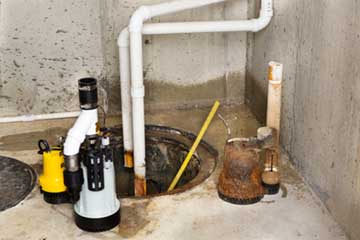
If you have never seen a sump pump, you may be imagining that it is a very large piece of machinery, like a big generator. But the truth is, they are around 2 feet in height and less than that in width. They are often buried in a hole (aka pit) in the basement or crawlspace floor. The chosen location should be the lowest part of the surrounding space.
External sump pumps are installed outside of the house. Much like the internal version that is installed in a pit, the external version is installed in a sump well which is normally located about 5 to 10 feet away from the building.
The reason it’s called a “well” is because it’s a round, concrete lined pit that is normally about 3 feet wide and 2.5 feet high.
External sump pumps are used on properties where the amount of water that could potentially penetrate the building is very high and would be overwhelming for the internal sump pump. It’s an extra layer of precaution against water damage.
Will An Outside Sump Pump Freeze?
Yes, just like any other pipe that is outdoors, the discharge lines from an external sump pump can freeze in frigid weather.
There are steps you can take to help to prevent this.
- If you live in an area that freezes every winter, and you are constructing your sewer well – we recommend that instead of the normal 2.5 feet depth, we recommend to go 5 feet. This will help to protect your pump from the freezing temperatures.
- Insulate the cover of the pit with rigid insulation.
- Use a 4 inch discharge pipe and install it with a good enough slope so that water doesn’t sit in the pipe.
If you find that your existing external sump pump freezes every winter, you may have to reconstruct it properly to avoid these problems.
What Does A Sump Pump Do?
Sump pumps pull water away from the house and depending on your property, either disperses it or dumps it into a well or municipal storm drain.
It’s basically a piece of equipment that can help prevent flooding in a lower level floor like a basement. It works to remove water and then deposit that water into a pit which is a hole normally made in the basement level.
If you live in an area that is near a water table or your home is at a lower level than your street (many homes in Georgia have driveways that go down from the street to the garage) then your lower level or basement may be susceptible to flooding. A sump pump removes that water and decreases the chances of severe water damage to your home.
Do You Need One?
Although having a sump pump (either internal or external) is not mandatory, it is recommended if your home sits in on land that is near a water table or sites at a lower level than your street (many homes in Georgia have driveways that go down from the street to the garage) then your lower level or basement may be susceptible to flooding.
It can save you thousands of dollars in possible water damage.
If you have any questions about sump pumps, call Atlantis Plumbing today at 770-505-8570. We are available 24 hours a day, 7 days a week.